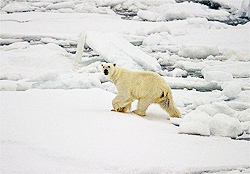Breaking the ice
 Russia is slated to invest some $224 billion into Arctic oil and gas exploration through 2030, with the government picking up the tab for $32 billion and the profits are expected to amount to almost half a trillion dollars.
Russia is slated to invest some $224 billion into Arctic oil and gas exploration through 2030, with the government picking up the tab for $32 billion and the profits are expected to amount to almost half a trillion dollars.
The Natural Resource Ministry is keen to bring in a slew of private and state-owned firms to invest, and profit from, the program. "The Ministry believes it's high time to extend the list of firms that can develop the Arctic shelf and include relevant legal entities registered in Russia and abroad," a spokesperson for the ministry's state policy department told The Moscow News. "The Ministry proposes to improve tax and customs systems, intended to improve the investment climate."
According to the ministry, only two domestic companies are currently allowed to conduct continental shelf exploration state-owned Gazprom and Rosneft.
Gazprom has applied to the ministry for eight licenses to launch future exploration projects in the Arctic.
"In April 2011 Gazprom approved a program to develop hydrocarbon resources on the continental shelf in Russia through 2030," a Gazprom spokesperson told The Moscow News.
The Arctic shelf holds some 70 billion tons of oil and gas, the largest reservoir in Russia. Gazprom hopes to get as much as 200 billion cubic meters of natural gas and over 10 million tons of oil from the shelf annually starting in 2030. But experts point to a number of problems that need to be resolved before the exploration program gets underway.
"There is no technology to ship fossil fuels from the sea to the terminal on the coast. For instance, the Shtokman field, the most promising gas field in the Barents Sea, is 650 km away from the nearest village on the Kola Peninsula.
If the fuel is shipped with tankers, it will become simply too expensive and [not profitable]," Mikhail Khutorskoy, a geology expert with the Institute of Geology at the Russian Academy of Science, told The Moscow News.
Another option building a pipeline on the seabed is too risky because it could be destroyed by icebergs, Khutorskoy added. "If there is an oil or gas spill there, then the ecological consequences will be disastrous," he said.
Khutorskoy pointed to another problem the cost of pumping in the absence of new technologies or a modern scientific approach. "We spend a lot of money on drilling, which can cost over $30 million per operation."
These problems, Khutorskoy said, have yet to be solved. "If Russia wants to start oil and gas exploration before 2030, then we need to do something about it now. There are 18 years to prepare the specialists in oil and gas and get the technology updated," Khutorskoy said.
Khutorskoy warned that without proper scientific study there might be no export potential left for Russian oil and gas by 2015.
With Russia about to spend over $200 billion on the project, experts also warn that only very high oil prices can justify the program.
"Huge investments are required to develop the shelf, and this will be justified only for sufficiently high oil prices and tax breaks," Yekaterina Rodina, an oil and gas analyst at VTB Capital, told The Moscow News.
Claiming the Arctic
Russia has been keen to claim the Arctic as its own territory. Just last year, the dormant Russian Geographical Society was revamped on orders from Prime Minister Vladimir Putin to launch a new series of expeditions to the Arctic.
Putin went on to invite BP CEO Bob Dudley last summer, in a move that raised questions about whether BP had its eyes set on Russian oil and gas in the Arctic.
Russian Geographical Society was not available for a comment Thursday on whether it would be involved in the new exploration program.
Environmental concerns
The exploration program is also raising serious concern over the potential of oil spills.
"The company uses the latest developments in the field of industrial and environmental safety to minimize negative impact on the environment. Gazprom is also consulting with leading environmental organizations and implementing a number of environmental monitoring programs," Gazprom's press service said in emailed comments.
However, experts warn that the risk of environmental damage is very high in the Arctic and may yet incur costs on Russian companies. By involving European companies, the project will have to comply with European standards meaning it will have to pay European environmental fines, which are much higher than in Russia. "Rosneft and Gazprom could simply go bankrupt by paying multi-billion dollar fines," Mikhail Khutorskoy said.

